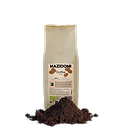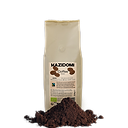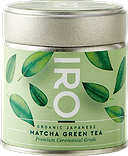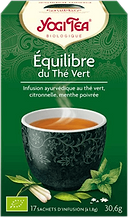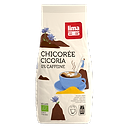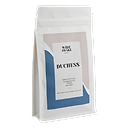Green tea and coffee are two staple beverages in our daily lives, often compared to each other. Green tea generally has a better reputation than coffee, but what do the facts actually say?
Caffeine and differences in consumption
Both beverages contain caffeine, a well‑known stimulant for our nervous system. Theine and caffeine are in fact the same molecule from the methylxanthine family—only the naming differs.
However, there are notable differences. A cup of tea contains about three times less caffeine than a cup of coffee, and its absorption is delayed in the body due to the tannins in tea. These tannins bind the theine to polyphenols, resulting in a gradual release. In contrast, in coffee caffeine is free and absorbed quickly into the bloodstream, making it fully bioavailable.
Thus, coffee acts as a quick energy boost, stimulating faster but for a shorter duration (around 2 to 3 hours), while tea also stimulates but without the sometimes harsh effects of coffee.
It's worth noting that the longer tea is brewed, the less stimulating it becomes, because prolonged infusion releases more tannins, neutralizing the theine’s effects. If you prefer coffee, an espresso offers a strong flavor with a more moderate caffeine content.
Antioxidants and beneficial properties
Organic tea and coffee both contain numerous antioxidants. Contrary to popular belief, organic whole‑bean coffee actually contains more antioxidants than tea. A cup of coffee can provide between 200 and 550 mg of antioxidants, while a cup of tea may contain up to 200 mg. However, while coffee excels in quantity, green tea stands out for its antioxidant potential (ORAC index). Moreover, green tea contains a particular polyphenol, EGCG, a powerful antioxidant not found elsewhere.
Antioxidants help protect the body from diseases, neutralize oxidative waste, and prevent premature aging.
Vitamins, minerals, and ingredients
Coffee tends to inhibit the absorption of certain vitamins, especially B‑vitamins, as well as minerals, which can increase the risk of deficiencies. It also increases urinary loss of calcium and magnesium, which over time can worsen certain health issues.
Tea, on the other hand, interferes with iron absorption when consumed with meals, reducing uptake by about 60%. For individuals with iron deficiency, it’s therefore important to consume tea 2 to 3 hours after eating, to avoid interference with meals.
Acid‑base balance and risks
Acid‑base balance is a crucial physiological concept referring to the stability of body pH. It must be maintained within a narrow range for optimal functioning. Proper balance prevents acidosis (excess acidity) or alkalosis (excess base), both of which can have serious health consequences. The body uses buffering systems, such as the kidneys and lungs, to regulate blood pH and maintain this essential equilibrium. Disruptions may arise from diet, illness, or metabolic disorders, affecting health in various ways.
Coffee tends to promote the loss of calcium and magnesium and increases gastric secretions, which can lead to heartburn. Its acidic pH may acidify body tissues, especially when consumed in large amounts, potentially contributing to demineralization and increased osteoporosis risk over time.
Black tea has similar effects to coffee, but green tea, with its neutral pH, helps maintain a healthy acid‑base balance in the body, reducing potential acidification risks.
Acrylamide
Acrylamide is a potentially harmful substance formed during high‑temperature cooking or roasting. Coffee contributes about 34% of an adult’s daily acrylamide intake, according to the EFSA. It naturally forms during high‑temperature roasting. Acrylamide is also present in other foods like chocolate, crisps, breakfast cereals, and bread—products roasted or baked at high temperature to develop flavor.
Coffee may contain variable levels of acrylamide, ranging from 130 to 2100 μg/kg depending on the type. For example, arabica coffee has much lower levels than robusta. Instant coffee also contains more acrylamide than other types. Nonetheless, coffee retains many antioxidants after roasting.
Green tea can also contain acrylamide, particularly if heavily roasted (e.g. hojicha). Levels depend on roasting process, duration, and preparation method.
While potentially harmful, acrylamide in reasonable quantities shouldn’t deter moderate consumption of these beverages.
Energy and calming properties
Coffee does not have a calming effect; it tends to mask fatigue rather than counteract it. As a result, it may lead to overuse of the body’s reserve energy, which can become exhausting in the long run.
Green tea, on the other hand, is more soothing and has calming properties thanks to an amino acid naturally found in tea leaves—L‑theanine. This compound softens the caffeine’s effect, promoting "alpha" brain waves and inducing a sense of relaxation. Green tea has also been associated with blood pressure reduction.
Impact on athletic performance
Coffee is often regarded as a sports ally, as it can enhance performance. It supports oxygenation and fat burning during exertion due to its caffeine content. Green tea can also be an option for improving sports performance.
However, caffeine may reduce blood flow to the heart precisely when the heart needs to be most efficient. Therefore, it is recommended not to consume caffeine immediately before exercise but at least 30 minutes beforehand.
Conclusion
In summary, the choice between green tea and coffee depends on your personal preferences and needs. Each beverage offers a unique set of benefits and flavors. Integrating these drinks into your daily routine can contribute to well‑being—but remember that moderation is key, and consumption should be tailored to your individual tolerance and physiology.
Also consider the quality of ingredients. A high‑quality green tea or organic coffee can offer a vastly superior taste and health impact.
FAQ – Frequently Asked Questions
-
Is green tea or coffee more effective for fat burning? Coffee is often linked to increased fat burning due to caffeine. However, green tea also contains caffeine and is known for weight‑loss support, especially thanks to EGCG. The choice depends on personal preference.
-
Which is better in the morning? Green tea is a gentler morning option due to its moderate caffeine content. Coffee, however, may suit those looking for immediate energy. Individual caffeine tolerance matters.
-
Which is healthier, green tea or coffee? Both beverages offer health benefits. Green tea is often linked to strong antioxidant effects and specific health properties. Coffee is also antioxidant‐rich and studied for potential benefits including reduced risks of Parkinson’s, Alzheimer’s, type‑2 diabetes, cirrhosis, and gallstones. The best choice depends on your needs and preferences.
-
How does brewing affect properties? Brewing time and water temperature significantly impact both green tea and coffee. Longer brewing for tea releases more tannins, affecting taste and reducing caffeine. For coffee, brew time affects intensity and flavour. Experiment to find what suits you best.
-
Which is more suitable for daily consumption? Choice depends on individual caffeine tolerance and taste preference. Green tea is a wise option if you prefer a lighter, low‑caffeine drink. However, moderation is key regardless of which you choose.
-
Do these drinks affect sleep? Caffeine in both can impact sleep, especially if consumed later in the day. Coffee tends to have a stronger impact due to faster bioavailability. Avoid them at least 6 hours before bedtime to preserve sleep quality.
-
What antioxidants do coffee and green tea contain? Both contain antioxidants that protect against oxidative damage. Coffee is rich in antioxidants; green tea contains specific compounds like EGCG and has a high ORAC index. They help neutralize free radicals and fight premature aging.
-
Do these beverages affect digestion? Coffee, especially in high amounts, can increase gastric secretions and cause heartburn. Green tea, with its neutral pH, can be gentler on digestion. Individual responses vary—monitor how these drinks affect your own digestive system.


